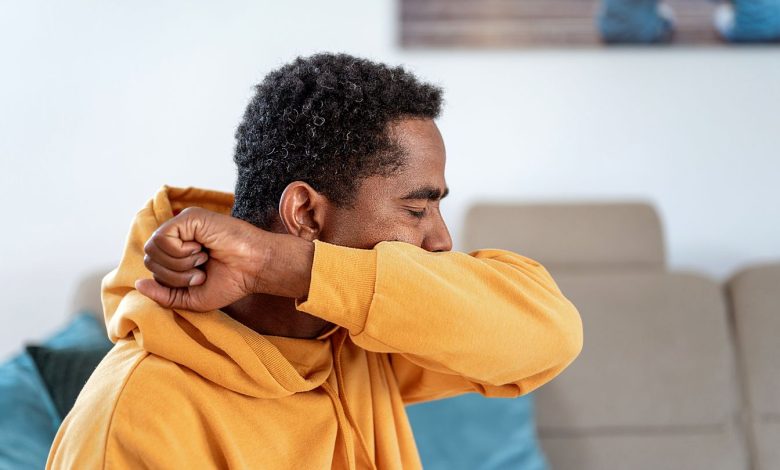How to Beat a COVID-19 Cough: Medications, Home Remedies, Tips

[ad_1]
How Common Is a COVID-19 Cough?
Coughing is no longer synonymous with COVID-19, as it was early in the pandemic. Yet it remains a top-10 symptom of infection with the omicron variant, popping up in spot 5 (a “dry” COVID cough, without phlegm) and 7 (a “wet” COVID cough, with phlegm), according to a 2022 report from the ZOE Health Study.
“Anywhere from 17 to 34 percent of people with COVID-19 will develop a persistent cough, and 70 percent will have some period of coughing,” says William Checkley, MD, PhD, a professor in the division of pulmonary and critical care at Johns Hopkins Medicine in Baltimore.
He adds, “The vaccines have done a good job of preventing more serious complications, but COVID can still affect the lungs and upper airways.”
How Long Does a COVID Cough Last?
A COVID cough can last anywhere from days to weeks — or even longer. A recent study published in the journal JAMA found that chronic cough is one of the most common symptoms of long COVID.
Of course many health conditions lead to coughing, not just COVID-19. A cough can be a hallmark of a cold, the flu, pneumonia, undiagnosed asthma, a lung disease such COPD, and acid reflux. Plus many types of viral and bacterial infections — not just COVID-19 — can lead to post-nasal drip, which triggers coughing by irritating the back of the throat.
These coughs tend to sound the same even to doctors. “A COVID-19 cough is similar to the cough produced by other viral or bacterial pneumonias [lung infections],” says Dr. Checkley. “It’s one of the cardinal symptoms of anyone who has a respiratory infection, including COVID.”
Is Coughing a Healthy Reflex?
As unsettling as it is to deal with any kind of cough, this protective reflex is necessary for bouncing back from an infection. “You don’t want to suppress coughing too much because if there are secretions, like mucus, you have to be able to clear them out,” says Klitzman. “The major reason older people with pneumonia die is that they decline and become too weak to even cough and clear their lungs.”
All of us have sensory nerves in the epithelium, the thin layer of tissue that forms the outer lining of body parts ranging from the eardrums, heart, and stomach to the larynx (voice box), trachea (windpipe), and bronchi, explains Checkley.
Normally, when sensory nerves detect a virus or other foreign invader, they activate cough sensors in the medulla region of the brain, which in turn trigger the muscles around the respiratory tract to eject the unwanted visitor.
“But it’s also possible that the COVID-19 virus may directly or indirectly target the sensory nerves themselves, as a part of the infection,” says Checkley, adding that this theory needs further study. In a report in the March–April 2023 issue of Lung India, researchers found that a heightened cough reflex due to inflamed sensory nerves may be one reason so many people with COVID-19 or other respiratory viruses end up with a cough that won’t quit.
The same study found that using inhaled corticosteroids can be a good treatment option. “Some inhalers can do a good job of reducing coughing,” says Checkley. That’s why you shouldn’t just resign yourself to relentless coughing but talk to your doctor about potential remedies.
How to Prevent Coughs From Spreading Germs
As most of us know by now, it’s crucial to cover a COVID-19 cough with a face mask (ideally), a tissue, or even a bent elbow to reduce the spread of infectious respiratory droplets and aerosols.
A report published in January 2022 in the physics journal AIP Advances that studied how droplets are dispersed via coughing also recommends lowering your head when you cough to reduce the risk of transmitting COVID-19 to others.
If your COVID cough lasts even after you’re past the worst of the acute infection, could you still be spreading COVID-19? “The risk of transmissibility drops significantly after 10 days,” says Checkley. “But while you don’t have to stay isolated at home if you’re coughing, it’s prudent — and polite — to continue wearing a mask.”
How to Get Rid of a COVID Cough
Fortunately, there are many simple things you can do for COVID cough relief. “It can help to elevate yourself when sleeping by slipping a wedge under your pillow,” says Klitzman, who adds that over-the-counter cough suppressants — antitussives — taken before bed can also be very helpful. So can cough suppressants with codeine. “But the latter can make you sleepy, so they are good to use at night, but you don’t want to become reliant on that,” she says.
A course of the COVID-19 medication Paxlovid (nirmatrelvir and ritonavir) may also be an effective COVID cough treatment. People ages 50 and up as well as those with certain underlying medical conditions should talk to their doctors about treatments like Paxlovid as soon as they are diagnosed with COVID-19, according to the Centers for Disease Control and Prevention (CDC).
As for Gallo Weppler, nearly two months after she was first infected, she still finds herself coughing occasionally. “It’s annoying, but not so much that I feel the need to go back to the doctor,” she says. If the hacking keeps her up at night, she uses a home remedy for cough that seems to do the trick for her: “I take a full teaspoon of honey to coat my throat and then I can fall asleep again.”
[ad_2]




